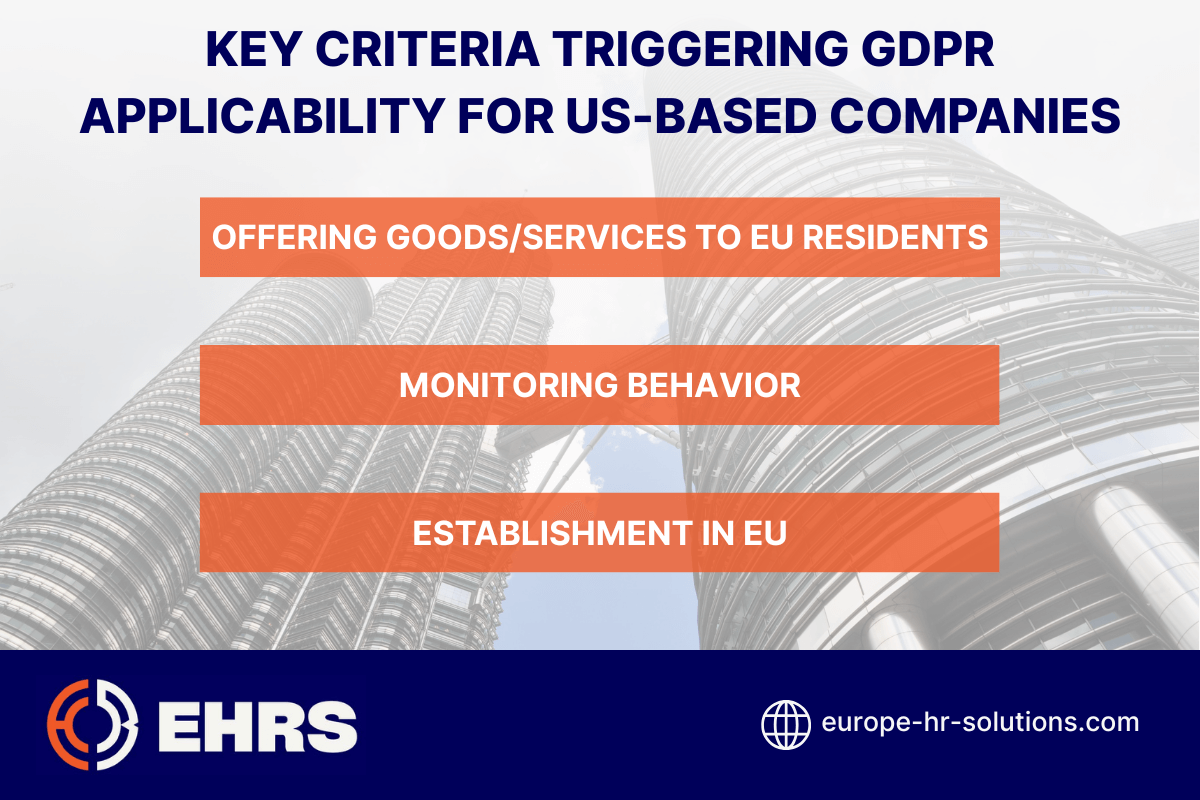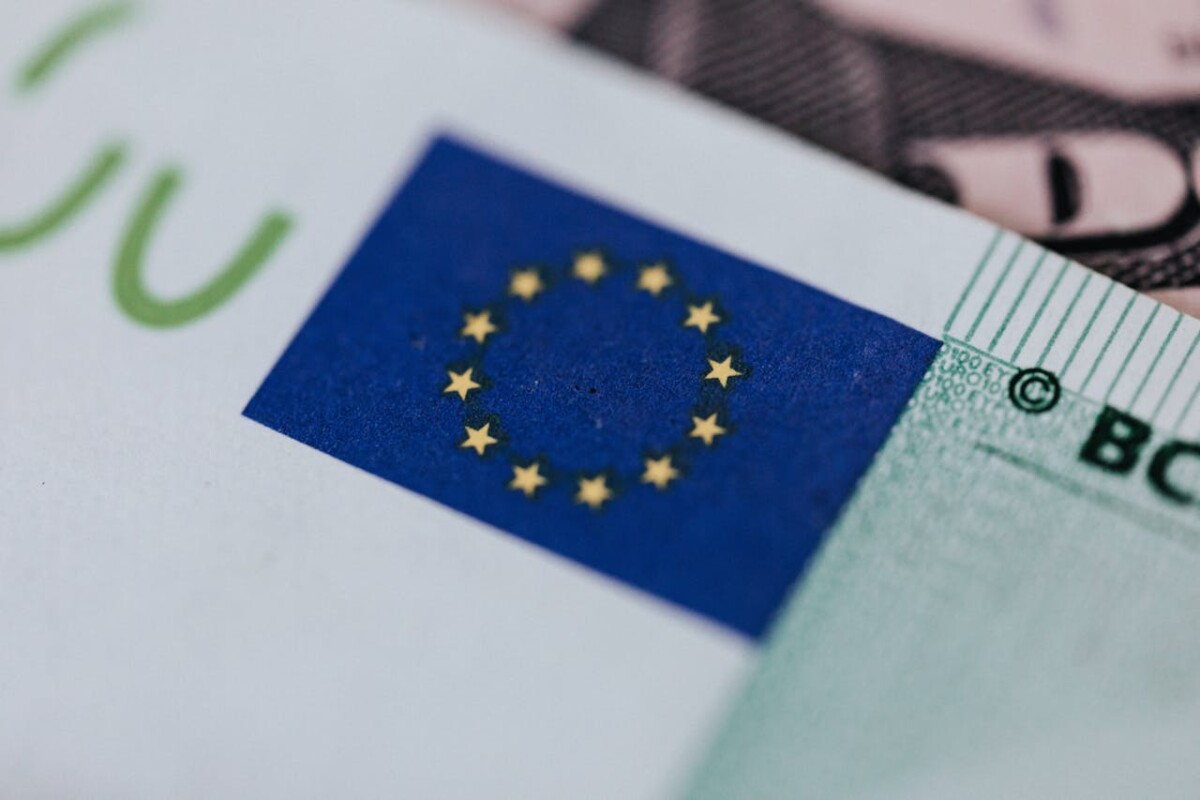This article clarifies the legal frameworks, enforcement mechanisms, and real-world impacts of GDPR penalties on American businesses, while offering actionable compliance strategies.
Explore how Meta, Google, and Apple faced multi-million sanctions and learn how companies can navigate cross-border data transfer rules to avoid similar risks.
Key Criteria Triggering GDPR Applicability for US-Based Companies
| Condition | Explanation | Examples |
| Offering goods/services to EU residents | Targeting EU markets, including free services | Online retailers shipping to Europe, social media platforms with EU users |
| Monitoring behavior | Tracking online activities of EU-based individuals | Advertising networks profiling EU users, health apps collecting location data |
| Establishment in EU | Physical presence through subsidiaries or offices | US tech firms with European headquarters |

Legal Basis for EU Fines on US Companies
The EU can fine US companies through GDPR’s extraterritorial scope when handling EU residents’ data. This legal foundation enables enforcement against non-EU entities processing personal data of European users.
Article 3 of GDPR establishes territorial scope covering companies outside the EU that offer goods or services to EU data subjects. This provision applies to US businesses monitoring European consumer behavior or facilitating cross-border transactions with EU residents.
When US Companies Fall Under GDPR Jurisdiction
US businesses fall under GDPR jurisdiction when offering goods/services to EU residents, monitoring their behavior, or maintaining EU-based operations. These criteria determine applicability for data protection obligations.
US companies targeting EU markets through online services, location tracking, or behavioral monitoring face enforcement actions. For example, Meta’s data processing activities triggered compliance requirements despite headquarters in California.
Maximum Penalties and Fine Structure Under GDPR
The EU can fine US companies up to €20 million or 4% of global turnover under GDPR’s two-tiered system. This creates significant financial exposure for non-compliant American businesses.
- Severity of data protection breaches
- Intentional or negligent violation patterns
- Cooperation with data protection authorities
- Previous GDPR compliance violations
- Implementation of corrective measures post-violation
Large tech firms like Apple and Google face substantial risks due to global turnover-based penalties. Instagram received €405 million for child data violations while Meta and Google faced €60 million fines for cookie consent failures, demonstrating enforcement realities for American companies.
Major GDPR Fines Imposed on American Companies: Case Studies
Meta (Facebook) GDPR Violations and Penalties
The EU can fine US companies for GDPR breaches, as demonstrated by Meta’s €1.2 billion penalty. This landmark sanction highlights the European Commission’s strict enforcement against data privacy violations by American tech firms.
Ireland’s Data Protection Commission investigated Meta’s data processing practices, leading to multi-billion-dollar penalties. The probe focused on unlawful data transfers to the US and inadequate user consent mechanisms, establishing a precedent for transatlantique tech regulation.
Google’s GDPR Compliance Challenges
Google faced multiple GDPR fines across EU member states for transparency and consent failures. French authorities penalized the company for opaque data collection practices related to personalized advertising.
France’s CNIL imposed a €60 million fine on Google for insufficient user information about data processing. The authority criticized Google’s complex data policies and lack of valid consent mechanisms for behavioral tracking.
Apple’s Confrontations with EU Regulators
Apple encountered GDPR scrutiny over App Store privacy policies and user tracking mechanisms. European authorities investigated the company’s approach to third-party app compliance and data transparency.
EU regulators examined Apple’s App Store data handling, particularly its App Tracking Transparency policy. The investigation assessed whether Apple’s privacy measures aligned with GDPR requirements for user control and data minimization.
Other Notable Cases Involving American Companies
Major GDPR Fines Imposed on US Companies: Key Cases and Enforcement Authorities
| Company | Violation Type & Authority | Fine Amount (EUR) |
| Meta (Instagram) | Violation of child data protection rules by Irish Data Protection Commission | 405 million |
| Cookie consent issues by CNIL France | 60 million | |
| Facebook (Meta) | Cookie consent failures by CNIL France | 60 million |
| Clearview AI | Biometric data processing without legal basis by Italian Data Protection Authority | 20 million |
Common compliance failures among US companies include inadequate cookie consent mechanisms, unauthorized data transfers, and insufficient breach disclosures. The EU can fine US companies for systemic data governance issues, with enforcement authorities prioritizing transparency and user control.
Political and Economic Implications of EU Fines on US Companies
Transatlantic Tensions and Political Responses
The EU can fine US companies through GDPR enforcement, creating diplomatic friction. American lawmakers argue this extraterritorial application undermines US sovereignty and economic interests.
US legislators criticize the EU for disproportionately targeting American tech firms. They claim fines exceeding €4.68 billion—83% of total GDPR penalties—reflect systemic bias against US businesses.
Criticisms from US Lawmakers
Critics in the US highlight several concerns about EU enforcement:
- Perceived unfair targeting of US tech firms through strict GDPR penalties
- Extraterritorial enforcement seen as regulatory overreach
- Penalties calculated as 4% of global turnover despite limited EU market share
- Conflicts between GDPR requirements and US surveillance laws like FISA
Trump Administration’s Approach and Future Dynamics
President Trump’s administration challenged GDPR enforcement mechanisms. A 2020 executive order denounced “unfair targeting” of US companies through “lawfare” tactics by foreign regulators.
Future administrations may adopt varying strategies. While Trump-era policies threatened unilateral revocation of the EU-US Data Privacy Framework, newer approaches could prioritize negotiated solutions. The EDPB’s 2023 guidelines highlight ongoing efforts to balance transatlantic data flows with privacy protections.
Compliance Strategies for US Companies to Avoid GDPR Fines
Important GDPR Compliance Requirements for American Businesses
The EU can fine US companies for non-compliance with core GDPR obligations. American businesses must appoint EU representatives, implement privacy by design, conduct data protection impact assessments, and establish breach notification protocols to meet regulatory standards.
Key compliance measures include appointing EU-based representatives for extraterritorial enforcement, embedding privacy into product development, and documenting data processing activities. Companies must also prepare breach response plans to meet GDPR’s 72-hour reporting requirement, ensuring transparency and accountability in data handling practices.
Data Transfer Mechanisms for US Companies After Privacy Shield
The EU can fine US companies for unlawful data transfers post-Privacy Shield. Standard Contractual Clauses (SCCs), Binding Corporate Rules (BCRs), and the EU-US Data Privacy Framework now govern cross-border data flows to ensure compliance.
Standard Contractual Clauses provide contractual safeguards between data exporters and importers. Binding Corporate Rules standardize data protection for multinational groups. The new EU-US Data Privacy Framework, detailed in EDPB’s 2023 guidelines, requires US companies to self-certify and adhere to enhanced data governance to legally transfer EU personal data.
The EU’s authority to impose GDPR fines on US companies underscores the global reach of data protection standards, as seen in high-profile cases against Meta, Google, and Apple. Proactive compliance—like adopting Standard Contractual Clauses or EU-US frameworks—remains important to avoid penalties tied to global turnover. For American businesses, navigating this landscape isn’t just about avoiding sanctions; it’s about building trust and securing long-term competitiveness in an era where data privacy defines digital integrity.
Frequently Asked Questions (FAQ)
What American Data Is Protected by GDPR?
The GDPR doesn’t specifically protect “American data.” Instead, it safeguards the personal data of individuals within the European Union, regardless of their nationality, including American citizens residing or traveling in the EU. The key factor is whether an organization processes the personal data of individuals located in the EU.
The GDPR applies to US companies if they have an EU-based establishment, offer goods or services (even for free) to EU users, or monitor the behavior of EU-based individuals. Protected data includes any information relating to an identified or identifiable person, such as name, address, email, location data, IP address, browsing data, health data, and financial data. If a US company collects and processes this data from individuals in the EU, it must comply with the GDPR.
How Does GDPR Affect Small American Businesses?
GDPR affects small American businesses if they process the personal data of individuals located in the EU or EEA. This includes businesses that provide goods or services accessible to consumers in the EU/EEA, or monitor user behavior in these regions. GDPR does not set a size or revenue threshold for businesses.
To comply, small businesses must conduct a privacy audit, determine the legal basis for data processing, create a GDPR-compliant privacy policy, obtain and manage user consent, use compliant data processing agreements, follow data security and storage guidelines, and meet international data transfer requirements. Non-compliance can lead to significant fines, up to €10 million or 2% of annual gross turnover, whichever is higher. Those without an EU presence must designate an EU representative.
What Is the Impact of GDPR on American Innovation?
GDPR has a significant impact on American companies, particularly those with a web presence targeting European consumers. The regulation applies if a company collects personal or behavioral data from individuals in an EU country, even without a physical presence in the EU. Targeted marketing in an EU country’s language is a key factor.
American companies must obtain explicit consent for data collection. In case of a data breach, they must notify the EU supervisory authority within 72 hours if the breach poses a risk to individuals’ rights and freedoms. Non-compliance can result in substantial fines, up to 2% of global turnover for breach notification failures and up to 4% for more serious violations. The GDPR has incentivized American businesses to revise their data protection practices and align them with European standards, potentially stimulating innovation in privacy technologies.
How to Challenge a GDPR Fine in Europe?
Any natural or legal person has the right to an effective judicial remedy against a legally binding decision of a supervisory authority concerning them. This right exists without prejudice to any other administrative or non-judicial remedy. Additionally, a data subject has the right to an effective judicial remedy where the competent supervisory authority does not handle a complaint or inform them of the progress or outcome of their complaint within three months.
An action against a supervisory authority must be brought before the courts of the Member State where the supervisory authority is established. Member States must ensure effective judicial redress and due process in the exercise by the supervisory authority of the powers conferred on it by Article 83 of the GDPR, particularly concerning administrative fines. A data subject has the right to mandate a not-for-profit body to lodge a complaint on their behalf.
Does GDPR Apply to American Citizens in Europe?
GDPR applies to any organization processing the personal data of individuals located in the EU, even if the processing takes place outside the EU. This means that GDPR can apply to American citizens in Europe if their personal data is processed by an organization subject to this regulation. Nationality is not a determining factor for the application of GDPR; it is the location of the person at the time of data processing that is important.





